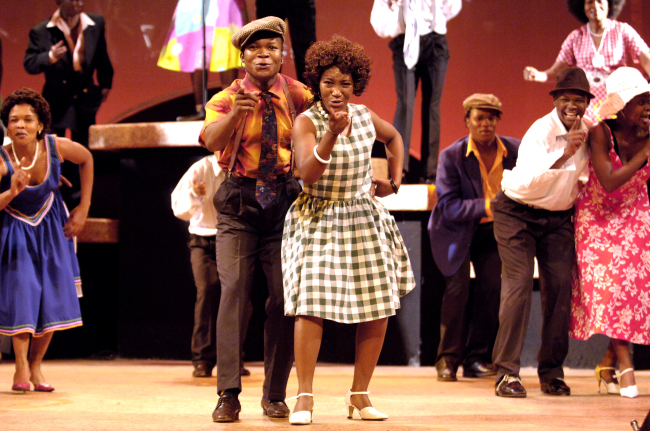뮤지컬의 본고장 웨스트엔드(West End)를 뒤흔든 뮤지컬 “우모자: 말로 함께하는 정신”이 내한 10주년을 기념하여 오는 5월 14일부터 2주간 충무아트홀 대극장에서 네번째 내한공연을 가진다.
뮤지컬 우모자는 2000년 초연 이후 12년간 총 26개의 나라에서 공연을 펼쳤으며 2003년, 2004년, 2007년 총 세 차례에 걸쳐 내한공연을 했다. 우모자는 스와힐리어로 함께하는 정신(The Spirit of Togetherness)을 뜻하며 원시 부족사회에서부터 오늘에 이르기까지 남아프리카인들의 역사를 음악의 일대기로 구성한 작품이다. 출연하는 30여명의 배우들은 실제로 가난하고 열악한 환경의 출신들이 대부분이다.
심금을 울리는 아프리카 드럼소리로 시작하여 원시부족의 역동적인 음악과 춤을 표현하며 이국적이고 신비한 광경을 연출한다. 요하네스버그의 활기 넘치는 거리로 배경을 옮겨 1948년부터 1994년까지의 인종 차별 정책 아래 흑인을 멸시하던 아파르트헤이트시대를 표현하기도 한다. 다시 한번 장면이 바뀌어 불법으로 운영되던 옛 술집 쉬빈에서 근처 광산과 값싼 숙소에 머물던 흑인 노동자들의 모습을 연기한다. 억압당하던 노동자들의 도피처였던 쉬빈에선 마침내 우리에게 친숙한 하우스뮤직과 힙합을 포함 남아프리카 댄스 음악 크와이토까지 다양한 음악과 춤을 선사한다.
인종 차별 정책으로 망가졌던 소피아타운과 요하네스버그의 흑인들의 문화의 중심이었던 재즈, 쇠사슬로 발이 묶인 채 말을 하는 것이 금기되었던 노동자들이 부츠를 두드리며 대화하면서 시작된 검부츠 댄스 등 우마자가 더욱 특별한 이유는 이 공연의 음악과 춤에 있다.
한 기획자에 의하면 이 공연의 하이라이트는 전 출연진이 가스펠을 합창하는 부분이다. 특히 출연진들이 객석으로 내려와 다 함께 노래하는 부분은 더욱더 웅장하고 폭발력이 있다고 밝혔다.
우마자의 공동 제작자 토드 트와라(Todd Twala)와 템니 니안드니(Thembi Nyandeni)는 소웨토라는 남서부의 흑인 거주 구역 출신으로 불우한 환경 속에서 살아가던 젊은이들 중 끼와 재능이 넘치는 이들을 발탁하여 꾸준한 훈련과정을 거쳐 우모자의 개막을 통해 준비된 배우로 만들었다. 관계자에 의하면 출연진들의 대부분은 현재 본인들의 프로덕션을 만들어 제작자가 되거나 남아공의 유명 연예인이 되어 활약하고 있다고 한다.
이번 내한공연은 5월 14일부터 26일까지 2주간 충무아트홀 대극장에서 열리며, 인천, 구리, 부산에서는 5월 28일부터 6월 8일까지 공연된다. 보다 자세한 사항은 (02) 548-4480로 문의 가능하다.
(코리아 헤럴드/번역 서혜림)
<관련 영문 기사>
Energy of South Africa explodes on stage
South Africa’s “Umoja: The Spirit of Togetherness” returns to Seoul for fourth time
By Claire Lee
Six years after its 2007 Seoul run, South Africa’s iconic musical “Umoja: The Spirit of Togetherness” is back in Korea to show off the country’s colorful and explosive culture, deeply linked to its stormy history.
The musical’s title, “Umoja,” is the Swahili word for “unity.” The show features some 30 young South African performers, many of whom come from impoverished and disadvantaged families. It had its premiere in South Africa in 2000 and had a popular run in the West End in 2001. It has had three previous runs in Seoul, in 2003, 2004, and 2007, respectively. The musical has toured to over 26 countries in the past 12 years.
It offers South African music as well as the history of its people. It starts off with the potent rhythms of the tribal music of South Africa’s ingenious people.
It then takes the viewers to the vibrant streets of Johannesburg when the country was under apartheid, a system of racial segregation enforced through legislation by the South African government from 1948 to 1994. In the scene, the young singers, dancers, drummers and marimba players show what it was to go through racism on a daily basis in the city.
The viewers are also taken to a shebeen, an illicit bar where excisable beverages were sold without a license in the past in South Africa, as well as the mines and a cheap hostel where laborers spent much of their time working and drinking.
The musical eventually features relatively modern South Africa, where contemporary Kwaito, a variant of house music featuring traditional African sounds that emerged in Johannesburg during the 1990s, filled clubs and bars. The youngsters, now no longer under apartheid, dance freely and show off their explosive energy.
The musical is known for its music and dance, such as the Jazz of Sophiatown, a suburb of Johannesburg and a legendary black cultural hub destroyed under apartheid; and the gumboot dance, or “gumboots,” a South African dance performed by dancers wearing Wellington boots. The dance -- which requires the dancers to keep stamping on the ground -- is said to have been used as a code to communicate in the mines as miners were not allowed to talk at all while at work.
One of the biggest highlights of the show, according to its local promoters, is the scene where all of the performers, as a choir, sing a Gospel song. The performance is said to be powerful and explosive, especially as the members of the choir walk down to the audience as they sing along.
The show’s co-creators, Todd Twala and Thembi Nyandeni, reportedly are from Soweto, the most populous black urban residential area in South Africa. They hired street youngsters from disadvantaged backgrounds, who had no acting or singing training, to star in the first run of Umoja. According to local promoters, a number of young performers who participated in the show’s early runs have now become established theater producers and celebrities. Auditions for the show are ongoing.
The Seoul run of “Umoja: The Spirit of Togetherness” runs through May 26 at Chungmu Art Hall. It will have separate runs in Incheon, Guri, and Busan from May 28 to June 8. For more information, call (02) 548-4480. (
dyc@heraldcorp.com)








